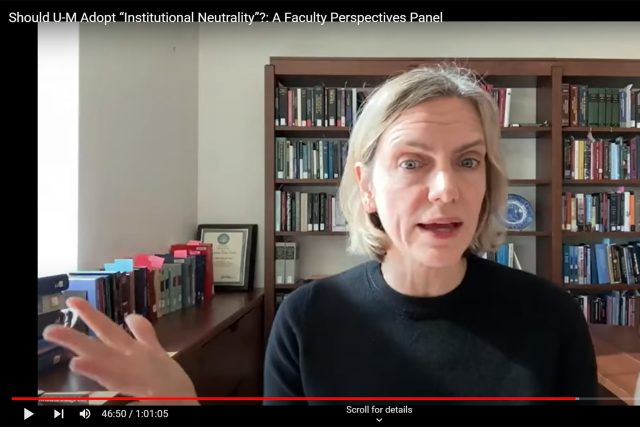[ad_1]
The Senate Advisory Committee on University Affairs hosted a virtual panel discussion on institutional neutrality Wednesday in response to a draft neutrality bylaw proposed by the University of Michigan Board of Regents. The bylaw was written to address recommendations from the Advisory Committee on the University of Michigan Principles on Diversity of Thought & Freedom of Expression.
English professor Lucy Hartley moderated the discussion between panelists Kristina Daugirdas, chair of a subcommittee that worked on the report; Basit Zafar, professor of economics; Hank Reichman, chair of the American Association of University Professors Committee on Academic Freedom and Tenure; and Silke-Maria Weineck, a member of SACUA’s General Counsel’s Advisory Committee.
According to the draft bylaw, members of University leadership may not issue statements on sociopolitical issues on behalf of the University unless such a statement relates directly to the University’s internal governance. The bylaw was drafted in response to the advisory committee’s finding that political minorities on campus — particularly those with conservative political views — felt persecuted for their beliefs.
Hartley opened the panel by explaining the reasons for the bylaw’s proposal, citing the need to protect diversity of opinion and freedom of expression on campus.
“Teaching and learning and scholarship thrive on curiosity and uncertainty and ongoing debate,” Hartley said. “Institutional statements suggest that complicated questions have only one correct answer and that we should all look to a university leader to find out what that answer is.”
Zafar compared the methodology of the U-M advisory report to similar reports at other universities. He criticized the U-M report as unrepresentative, referencing the small pool of data from which its conclusions were drawn. The report included input from a total of 4,000 U-M community members, including comments from 1,141 undergraduate and graduate students and 887 faculty members.
“When you look at the data, we basically have comments from less than 2,000 students or faculty,” Zafar said. “The student and faculty size at the University of Michigan’s three campuses is about 75,000 people. So we’re talking about a response rate of less than 2% for students and less than 10% for faculty. The point that I want to make here is that the data are just not representative enough or credible to be informative.”
Zafar also challenged the premises the bylaw was written on. He said given the possibility that the concerns identified in the report are not representative of campus sentiment, the University may not need to implement a bylaw based on the report’s findings.
“There are significant perceptions that U-M’s climate of freedom of expression and diversity of thought is problematic,” Zafar said. “Now again, this is based on this non-representative data, and the question that this raises is, first of all, are these perceptions well grounded? No one knows the answer, because we don’t have data on this. And then the second question is — because we don’t know the perceptions are well grounded — if the perceptions and feelings don’t align with reality, is it the University’s responsibility to cater to these perceptions?”
Weineck agreed with the report’s findings but said the bylaw would not resolve a sense of pressure to ideologically conform with the campus community that was identified by survey respondents.
“To the extent that some statements (by University leadership) across campus relate to ideological conformity … the statements are not the engine of that conformity, but the result of that conformity,” Weineck said. “Banning them will not lead to greater social acceptance of conservative minorities on campus.”
Weineck also said she believed the bylaw could result in the University taking implicit positions through policy, without having to explain the reasoning behind these actions.
“What the report leaves us with is that positions can and must be taken, but the reasons for taking them should not be publicly articulated, and I think that is a very bad state of affairs,” Weineck said.
Reichman similarly criticized what he sees as a contradiction within the bylaw: the University could not speak on issues but could act on them. Reichman said the University would inevitably take impactful political stances through action, even with the bylaw in place.
“Universities, like all other institutions, must be judged not only by their words but by their deeds,” Reichman said. “Every single day the University takes actions — indeed, must take actions — that imply a position, that imply a certain stance on an issue of controversy. And so I think we need to recognize that institutions cannot simply say, ‘Well, we won’t say anything about that, but we’re going to go do and act in certain ways that will, in fact, show clearly where we stand.’”
Daily Staff Reporter Lyra Wilder can be reached at lyrawild@umich.edu.
Related articles
[ad_2]
Source link











